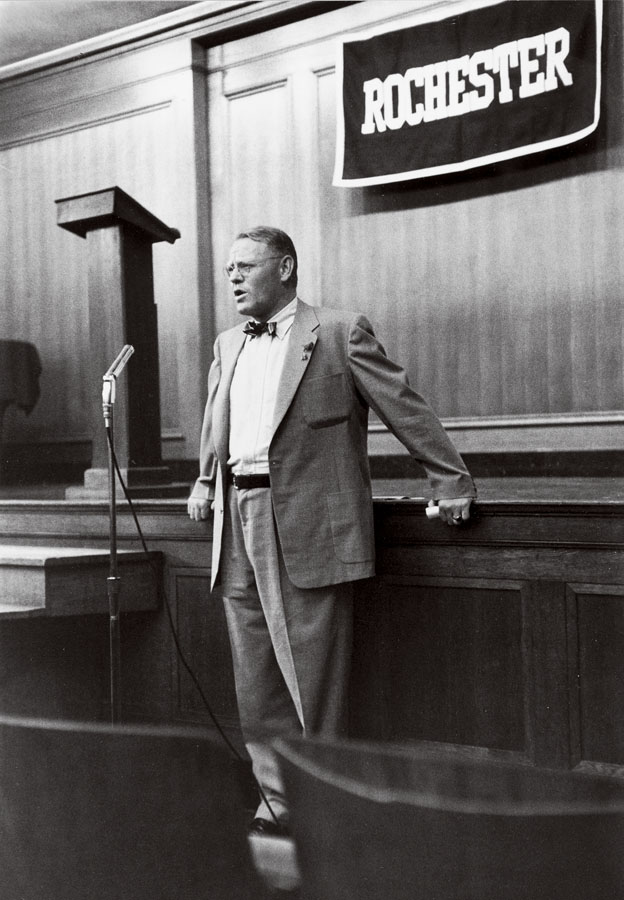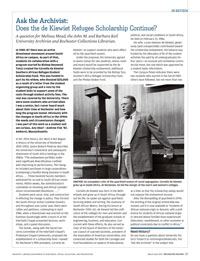In Review
 UNIFIER: An outspoken critic of the apartheid system of racial segregation, Cornelis de Kiewiet grew up in South Africa. At Rochester, he led the merger of the men’s and women’s colleges. (Photo: University Libraries/Department of Rare Books, Special Collections, and Preservation)
UNIFIER: An outspoken critic of the apartheid system of racial segregation, Cornelis de Kiewiet grew up in South Africa. At Rochester, he led the merger of the men’s and women’s colleges. (Photo: University Libraries/Department of Rare Books, Special Collections, and Preservation)Need History?
Do you have a question about University history? Email it to rochrev@rochester.edu. Put “Ask the Archivist” in the subject line.
In 1985–87 there was an active divestment movement around South Africa on campus. As part of that, students (in collaboration with a program started by Bishop Desmond Tutu) created the Cornelis de Kiewiet Southern African Refugee Student Scholarship Fund. This was funded in part by his widow, who donated $20,000 as a result of a letter from the student organizing group and a vote by the student body to support some of the costs through student activity fees. The rest was covered by the University. There were some students who arrived when I was a senior, but I never heard much about their time at Rochester and how long the program lasted. Obviously with the changes in South Africa in the 1990s the needs and circumstances changed. I was part of this work as a student and am curious. Any idea? —Andrew Fisk ’87, Amherst, Massachusetts
In her 2014 history, Our Work Is But Begun: A History of the University of Rochester 1850–2005, Janice Bullard Pieterse describes the University’s investment and subsequent divestment of South Africa holdings in the 1980s: “The endowment portfolio underwent significant diversification credited with improving its performance. The changes included purchases in large corporations [containing] a handful doing business in South Africa. . . . Three hundred faculty members petitioned for an end to South African investments. Within weeks, the administration’s committee on investing and ethical considerations recommended divestiture. . . .”
Students were vocal, vital, and constructive in effecting the change in policy. They formed the South African Action Coalition (SoAAC), and throughout your junior year, there were rallies and petitions, culminating in April 1986, when a Shantytown was erected on the Eastman Quadrangle while a teach-in at the Interfaith Chapel presented lectures, workshops, and a panel discussion.
The SoAAC, along with the Social Concerns Committee of the Interfaith Chapel’s Protestant Chapel Community, proposed the establishment of a scholarship fund—named for Rochester’s fifth president, Cornelis de Kiewiet—to support students who were affected by the apartheid system.
Under the proposal, the University agreed to waive tuition for two students, whose room and board would be supported by the de Kiewiet scholarship endowment; additional funds were to be provided by the Bishop Tutu Southern Africa Refugee Scholarship Fund, and the Phelps-Stokes Fund.
Cornelis de Kiewiet was born in the Netherlands and grew up in South Africa; throughout his life, he spoke out against apartheid, lecturing widely and writing The Anatomy of South African Misery. During his tenure at Rochester (1951–61), de Kiewiet led the unification of the colleges for men and women and the establishment of the graduate schools of engineering, business, and education. Concurrent with these efforts, he also served as chair of the board of directors of the American Council of Learned Societies, president of the Association of American Universities, and conducted studies for both the Carnegie and Ford foundations on aspects of educational, political, and social conditions in South Africa. He died on February 15, 1986.
His wife, Lucea Hejinian de Kiewiet, generously (and unexpectedly) contributed toward the scholarship endowment; the balance was funded by the allocation of $1 of the student activities fee paid by all undergraduates for four years—an unusual and somewhat controversial move, but one which was approved by a student body referendum.
The Campus-Times indicates there were two students who started in the fall of 1987; others have followed, but not more than two at a time so that the scholarship outlay would not outpace the endowment income.
After the dismantling of apartheid in 1994, the wording of the original scholarship was revised, and it is now available to “students of African national origin or descent, with a preference for students of African national origin or descent whose families have experienced dislocation, resettlement, or other economic or political constraints due to conflict in Africa.”

